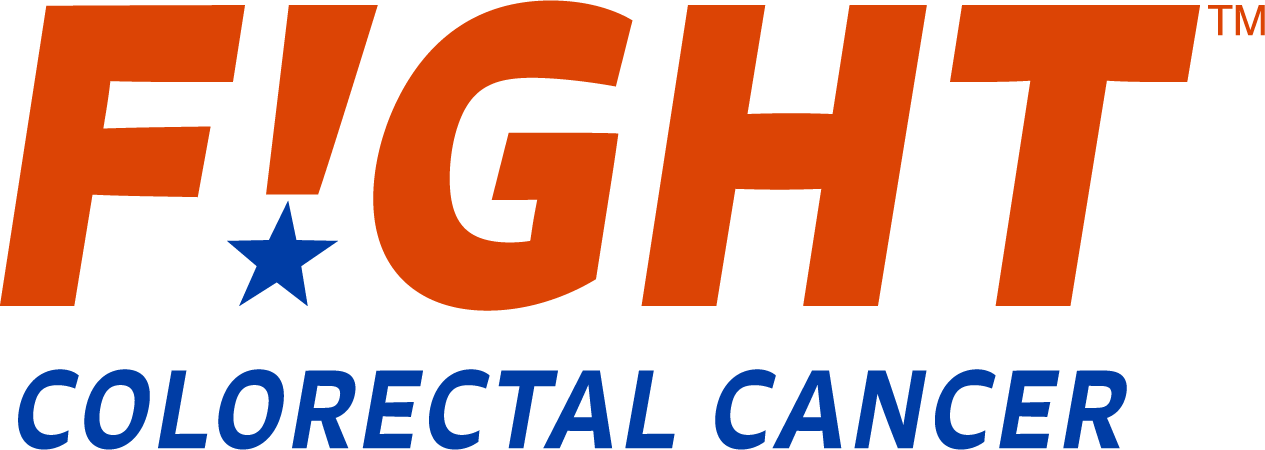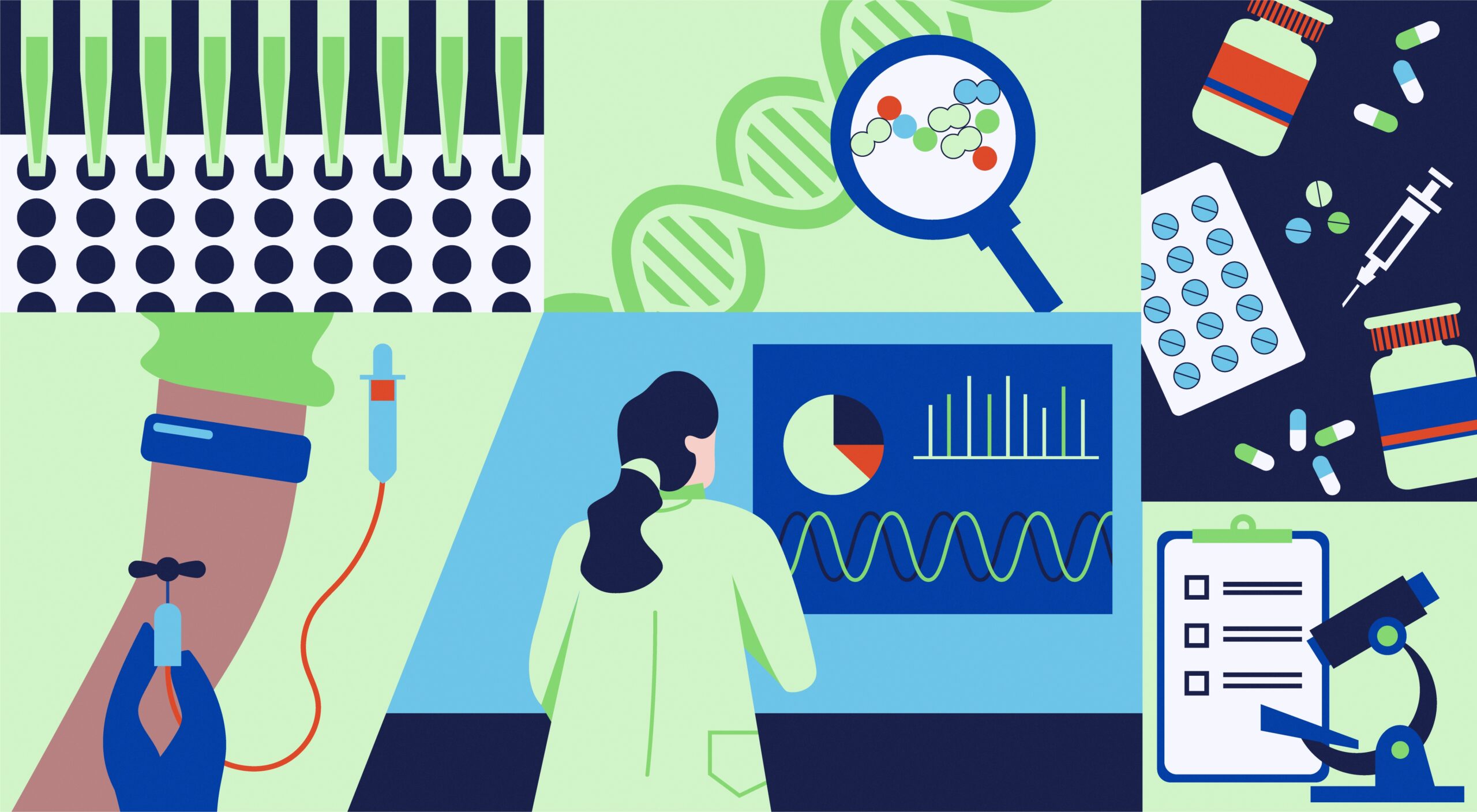Colorectal Cancer Biomarkers
What Is Biomarker Testing?
Biomarker testing may be referred to as tumor, molecular, mutation, somatic, or genomic testing. The actual test is most often performed on a small amount of tissue obtained from a tumor during a biopsy or surgery. If that’s not possible to collect, a blood sample may also be used.
The tissue or blood sample is sent to a specialized lab for testing and analysis. The lab will provide a report to your doctor based on its findings. Once your doctor receives your report, they should discuss it with you and explain how each finding can impact your treatment plan.
Not all colorectal cancers are the same. Your biomarker testing report will be specialized to you and your tumor, which should lead to personalized treatment planning.
According to the NCCN Guidelines for Patients, “Biomarkers are specific features of cancer cells. Biomarkers can include proteins made in response to the cancer and changes (mutations) in the DNA of the cancer cells.”
A broad definition often comes with biomarkers, but it’s anything that can be used as an indicator of a disease.
Inside cancer tumors lie a variety of different markers, and tumor testing helps you and your doctor learn what’s inside your tumor and how to approach your treatment plan. Biomarkers allow your doctors to measure what’s objective and true about your cancer.
Your colon or rectal tumor might not respond to the same treatment that other colorectal cancer patients receive, depending on the biomarkers in your tumor.
What are Biomarkers and How Can they Help?
Who Needs Biomarker Testing?
| Stage 0 & Stage I | Your tumor needs to be tested for MSI-H/dMMR. You need your CEA checked. If your stage I cancer recurs, you need to be tested for biomarkers for metastatic disease. |
| Stage II | Your tumor needs to be tested for MSI-H/dMMR. You need your CEA checked. Ask your doctor if there is a role for ctDNA testing. If your stage II cancer recurs, you need to be tested for biomarkers for metastatic disease. |
| Stage III | Your tumor needs to be tested for MSI-H/dMMR. You need your CEA checked. Ask your doctor if there is a role for ctDNA testing. If your stage III cancer recurs, you need to be tested for biomarkers for metastatic disease. |
| Stage IV / Metastatic Disease | Your tumor needs to be tested for MSI-H/dMMR. You need to know which side your tumor formed (Right or Left). You need your CEA checked. Ask your doctor if there is a role for ctDNA testing. Your tumor needs to be tested for genetic alterations, including KRAS, NRAS, and BRAF mutations, HER2 amplification, and NTRK fusions. |
Biomarker testing for metastatic colorectal cancer
Metastatic colorectal cancer is cancer that has spread beyond its original location in the colon or rectum and formed one or more tumors in other areas of the body, like the liver and/or lungs. Treatment possibilities for patients have been greatly extended due to biomarker testing, and especially for metastatic colorectal cancer patients.
If you’re a metastatic patient, it’s critical that you undergo biomarker testing, ideally before starting treatment, so you can know if you are likely to respond to available targeted therapies.
Pre-surgery biomarker tip! Before surgery, ask your doctor about biomarker testing and confirm your tumor tissue will be analyzed and a biomarker report will be provided to you.
Ask ChatCRC About Your Biomarkers
ChatCRC is your trusted partner in understanding your biomarker results.
Upload a photo or screenshot of your biomarker report, and ChatCRC will help you interpret what your results mean and what next steps you can discuss with your care team.
*Your privacy matters. ChatCRC does not store, share, or sell any information you provide—it’s simply a tool to help you feel more informed and empowered in your treatment journey.
What Do Your Biomarkers Mean?
Some biomarkers tell what kind of cancer you have (diagnostic). Some are used to learn about the estimated course of cancer if it goes without treatment by determining cell functioning (prognostic biomarkers), or if your tumor will respond well or poorly to certain treatments (predictive biomarkers).
Biomarkers can give insights to dosing decisions (pharmacodynamic), and they can also indicate if cancer is in your body once treatment ends (recurrence).
Here are the most common and studied biomarkers in colorectal cancer patients that may impact your treatment plan.
How Is Biomarker Testing Done?
There are many types of biomarker tests that can be run on your tumor and/or blood. A gene includes multiple components, both protein-coding (exonic) and non-protein coding (intronic). The following tests may be run on your genes:
- Single biomarker test: Looks at a single gene.
- Multigene tests/panel test: Looks at multiple genes
- Whole-exome sequencing: Looks at all protein-coding regions of genes in your cancer’s genome.
- Whole-genome sequencing: (next generation sequencing (NGS): Looks at all the DNA (beyond only the protein-coding segments) in your cancer. This technology allows for multiple genes to be tested at the same time, at a fairly low cost.
- Tumor-mutational burden: Looks at the number of genetic changes in your cancer.
You and your doctor should decide on the type of biomarker test performed based on your unique and specific needs.
Biopsy Types
Biomarker testing is typically done by either tumor biopsy or liquid biopsy.
Tumor Biopsy
A sample of cells or tissues from the tumor to be examined by a pathology lab. There are incisional biopsies, where only a sample of tissue is removed; and excisional biopsies, where the entire tumor is removed.
Liquid Biopsy
A sample of blood that is analyzed for DNA fragments released from tumor cells or tumor cells in the blood. Pathology labs are looking for circulating tumor DNA (ctDNA) and/or circulating tumor cells (CTCs).
There are currently three liquid biopsy tests approved by the Food and Drug Administration (FDA) for biomarker testing: Guardant360® CDx, FoundationOne® Liquid CDx, and CELLSEARCH for CTCs.
Navigating Tumor Testing vs. Genetic Testing
Genetic testing and tumor (or biomarker) testing are both crucial to understanding and treating colorectal cancer, but did you know that these tests serve different, but important, purposes? Join City of Hope Medical Center genetic counselor and researcher Heather Hampel, and Northwestern University oncologist Al Benson III, MD as they discuss the differences between genetic and tumor testing, the role both play in colorectal cancer treatment, and how to go about getting the relevant testing you need to best understand your treatment options.
Thank you to Menarini Silicon Biosystems for supporting this educational webinar.
Report Cards: Understanding Your Biomarker and Pathology Reports
Testing is something that all patients face, but few actually understand what’s going on. How do you read and understand the numerous reports you receive during treatment? Join Fight CRC, Carmen Fong, MD, and Rich Goldberg, MD as we discuss the keys to understanding your reports and how they impact your treatment.
Sponsored by: Amgen
Biomarker FAQ
I’ve seen the terms “somatic testing” and “germline testing.” What’s the difference and what does it have to do with biomarkers?
What if my doctor doesn’t recommend a biomarker test I know I need. (For example, if I have metastatic disease and I know I need HER2 evaluated).
What will my results look like? Will I get to see them?
Is it possible to have both KRAS and BRAF mutations?
Why do I need biomarker testing before I start treatment?
What if I’ve received treatment already and I don’t know my biomarkers?
Will I need another biopsy to test my tumor?
Why haven’t I heard about this before?
What are the downsides of biomarker testing?
I’ve had genetic testing. Does this mean I’ve had biomarker testing?
I’ve been told I have Lynch syndrome. Does this mean I’ve had biomarker testing?
Will my insurance cover biomarker testing?
Is there financial assistance for biomarker testing?
Who makes the guidelines about biomarker testing?
As of 2022, the National Comprehensive Cancer Network (NCCN) recommends microsatellite stability/instability (MSS/MSI) biomarker testing for all CRC patients, regardless of stage at diagnosis. Furthermore, they recommend KRAS, NRAS, BRAF, and HER2 biomarker testing for patients with stage IV, metastatic CRC.
There are several biomarkers without standardized recommendations. As research continues to evolve, guidelines and recommendations will also likely change to reflect the most relevant and meaningful research.








